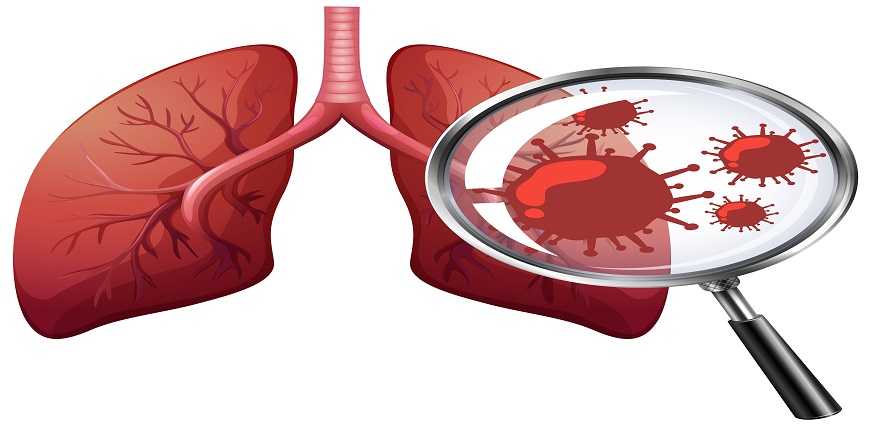


Pneumonia is a serious lung infection that affects millions of people each year. It can be caused by viruses, bacteria, or fungi, and symptoms can range from mild fever and cough to severe chest pain and difficulty breathing. Left untreated, pneumonia can cause significant complications such as organ failure or death. In this blog post, we will explore the causes and risk factors of pneumonia, discuss its symptoms and complications, and outline treatment options for those affected by the condition. We will also look at strategies for prevention and ways in which you can reduce your risk of developing pneumonia. Read on to learn more about this common but potentially life-threatening condition.
Pneumonia is a serious lung infection. It is most often caused by bacteria, but can also be caused by viruses or fungi. Symptoms include coughing, chest pain, shortness of breath, rapid breathing, sweating, and fever. Pneumonia can be dangerous, especially for infants, the elderly, and people with other health problems. Treatment usually involves antibiotics and rest.
Pneumonia is an infection of the lungs that can be caused by a number of different organisms, including bacteria, viruses, and fungi. The most common cause of pneumonia in adults is the bacterium Streptococcus pneumoniae, although other bacteria such as Haemophilus influenzae and Mycoplasma pneumonia can also cause the condition. viral infections, such as those caused by the influenza virus or respiratory syncytial virus (RSV), are also common causes of pneumonia, particularly in children. Pneumonia can also be caused by inhaling irritants such as dust or chemical fumes.
Pneumonia symptoms can vary depending on the person’s age. For example, infants and young children may not be able to communicate their symptoms as well as older kids and adults. But in general, people of all ages with pneumonia will have some combination of the following:
There are a variety of ways to diagnose pneumonia. The most common method is through a chest x-ray, which can show the presence of an infection in the lungs. Other diagnostic tools include a physical examination, blood tests, and a sputum culture. A diagnosis of pneumonia is often made based on the symptoms a person is experiencing, as well as their medical history.
Pneumonia is a serious lung infection that can be life-threatening. The best way to treat pneumonia is with antibiotics. Antibiotics can kill the bacteria that cause pneumonia. If you have pneumonia, you will likely need to take antibiotics for at least two weeks. You may also need to be hospitalized if your pneumonia is severe.
Pneumonia is a serious lung infection that can be life-threatening. It is important to take steps to prevent pneumonia, particularly if you are at increased risk for the disease. Some tips for preventing pneumonia include:
Pneumonia is an infection of the lungs.
The most common cause of pneumonia is a viral infection, such as the flu or the common cold. In some cases, pneumonia can be caused by inhaling irritants, such as smoke or dust.
The most common symptoms are:
Pneumonia is most commonly spread through contact with respiratory secretions, such as saliva or mucus, from an infected person. The bacteria can also be spread through the air when an infected person coughs or sneezes.
Food that should be avoided in pneumonia are:
Pneumonia can last for weeks or even months.
There are a number of measures you can take such as:
Treatment for pneumonia usually involves antibiotics and rest.
 Allergy Test
Allergy Test
 Anemia Test
Anemia Test
 Auto immune
Auto immune
 Blood disorder
Blood disorder
 Bone and Joint
Bone and Joint
 Cancer Test
Cancer Test
 Cardiology Test
Cardiology Test
 Covid Recovery
Covid Recovery
 Dengue Test
Dengue Test
 Depression
Depression
 Diabetes Test
Diabetes Test
 Fatigue
Fatigue
 Fever Test
Fever Test
 Full body
Full body
 Gastro Test
Gastro Test
 Gastrointestinal
Gastrointestinal
 Gynaecology Test
Gynaecology Test
 Heart Test
Heart Test
 HIV Test
HIV Test
 Hormone Test
Hormone Test
 Hypertension
Hypertension
 Immunity Test
Immunity Test
 Infectious Disease
Infectious Disease
 Infertility Test
Infertility Test
 Influenza Test
Influenza Test
 Iron Test
Iron Test
 Kidney Test
Kidney Test
 Liver Test
Liver Test
 Lung Test
Lung Test
 Nephrology
Nephrology
 Obesity
Obesity
 Orthopedics Test
Orthopedics Test
 Physician
Physician
 Pollution Health Checkup
Pollution Health Checkup
 Pregnancy Test
Pregnancy Test
 Prostate Test
Prostate Test
 Senior Citizen Test
Senior Citizen Test
 STD Test
STD Test
 Thyroid Test
Thyroid Test
 Tuberculosis Test
Tuberculosis Test
 Vitamin Test
Vitamin Test
 Women Health Test
Women Health Test